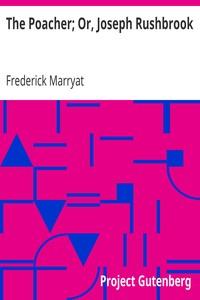Read this ebook for free! No credit card needed, absolutely nothing to pay.
Words: 176323 in 50 pages
This is an ebook sharing website. You can read the uploaded ebooks for free here. No credit cards needed, nothing to pay. If you want to own a digital copy of the ebook, or want to read offline with your favorite ebook-reader, then you can choose to buy and download the ebook.
Peter Simple, by Captain Marryat.
Captain Frederick Marryat was born July 10 1792, and died August 8 1848. He retired from the British navy in 1828 in order to devote himself to writing. In the following 20 years he wrote 26 books, many of which are among the very best of English literature, and some of which are still in print.
Marryat had an extraordinary gift for the invention of episodes in his stories. He says somewhere that when he sat down for the day's work, he never knew what he was going to write. He certainly was a literary genius.
"Peter Simple" was published in 1834, the fourth book to flow from Marryat's pen.
This e-text was transcribed in 1998 by Nick Hodson, and was reformatted in 2003, and again in 2005.
PETER SIMPLE, BY CAPTAIN FREDERICK MARRYAT.
THE GREAT ADVANTAGE OF BEING THE FOOL OF THE FAMILY--MY DESTINY IS DECIDED, AND I AM CONSIGNED TO A STOCKBROKER AS PART OF HIS MAJESTY'S SEA-STOCK--UNFORTUNATELY FOR ME MR. HANDYCOCK IS A BEAR, AND I GET VERY LITTLE DINNER.
If I cannot narrate a life of adventurous and daring exploits, fortunately I have no heavy crimes to confess: and, if I do not rise in the estimation of the reader for acts of gallantry and devotion in my country's cause, at least I may claim the merit of zealous and persevering continuance in my vocation. We are all of us variously gifted from Above, and he who is content to walk, instead of to run, on his allotted path through life, although he may not so rapidly attain the goal, has the advantage of not being out of breath upon his arrival.
As well as I can recollect and analyse my early propensities, I think that, had I been permitted to select my own profession, I should in all probability have bound myself apprentice to a tailor; for I always envied the comfortable seat which they appeared to enjoy upon the shopboard, and their elevated position, which enabled them to look down upon the constant succession of the idle or the busy, who passed in review before them in the main street of the country town, near to which I passed the first fourteen years of my existence.
But my father, who was a clergyman of the Church of England, and the youngest brother of a noble family, had a lucrative living, and a "soul above buttons," if his son had not. It has been from time immemorial the heathenish custom to sacrifice the greatest fool of the family to the prosperity and naval superiority of the country, and, at the age of fourteen, I was selected as the victim. If the custom be judicious, I had no reason to complain. There was not one dissentient voice, when it was proposed before all the varieties of my aunts and cousins, invited to partake of our new-year's festival. I was selected by general acclamation. Flattered by such an unanimous acknowledgment of my qualification, I felt a slight degree of military ardour, and a sort of vision of future grandeur passed before me, in the distant vista of which I perceived a coach with four horses, and a service of plate. But as my story is not a very short one, I must not dwell too long on its commencement. I shall therefore inform the reader, that my father, who lived in the north of England, did not think it right to fit me out at the country town, near to which we resided; but about a fortnight after the decision which I have referred to, he forwarded me to London, on the outside of the coach, with my best suit of bottle-green and six shirts. To prevent mistakes, I was booked in the way-bill, "To be delivered to Mr Thomas Handycock, Number 14, Saint Clement's Lane--carriage paid." My parting with the family was very affecting; my mother cried bitterly, for, like all mothers, she liked the greatest fool which she had presented to my father, better than all the rest; my sisters cried because my mother cried; Tom roared for a short time more loudly than all the rest, having been chastised by my father for breaking his fourth window in that week.
At last I tore myself away. I had blubbered till my eyes were so red and swollen, that the pupils were scarcely to be distinguished, and tears and dirt had veined my cheeks like the marble of the chimney-piece. My handkerchief was soaked through with wiping my eyes and blowing my nose, before the scene was over. My brother Tom, with a kindness which did honour to his heart, exchanged his for mine, saying, with fraternal regard, "Here, Peter, take mine, it's as dry as a bone." But my father would not wait for a second handkerchief to perform its duty. He led me away through the hall, when, having shaken hands with all the men, and kissed all the maids, who stood in a row with their aprons to their eyes, I quitted the paternal roof.
The coachman accompanied me to the stage. Having seen me securely wedged between two fat old women, and having put my parcel inside, he took his leave, and in a few minutes I was on my road to London.
Free books android app tbrJar TBR JAR Read Free books online gutenberg
More posts by @FreeBooks

: The Poacher; Or Joseph Rushbrook by Marryat Frederick - England Social life and customs 19th century Fiction; Fathers and sons Fiction; Murder Fiction; Poachers Fiction


: The Phantom Ship by Marryat Frederick - Sea stories; Horror tales; Immortalism Fiction; Flying Dutchman Fiction







